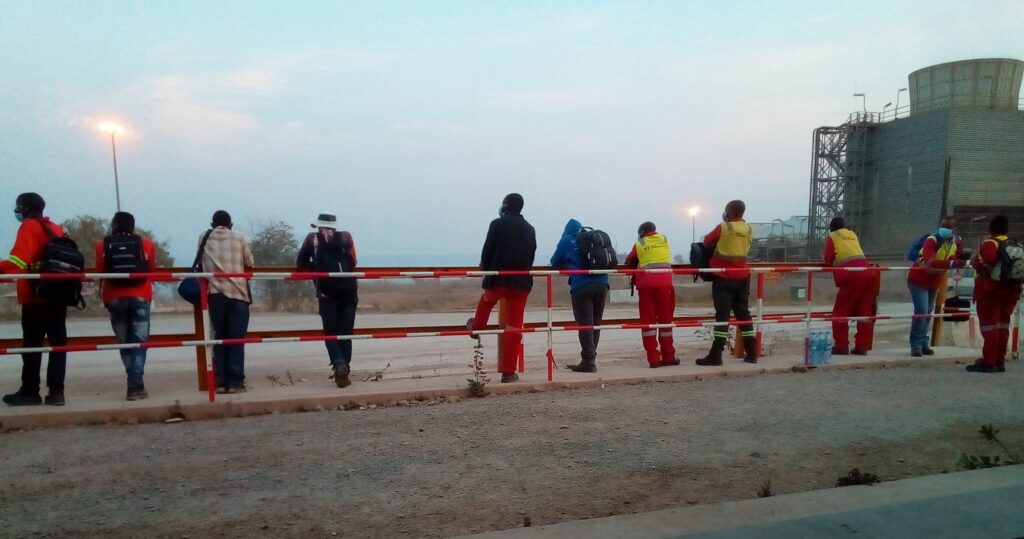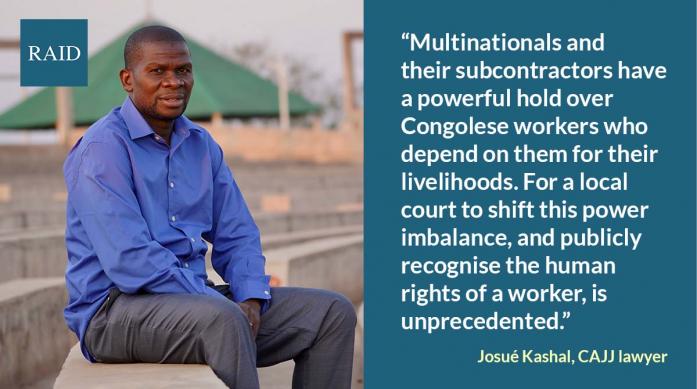Judicial victory sets new precedent for compensation for Congolese worker injured at Kisanfu mine
Pour la version francais, cliquez ici.
“Multinationals and their subcontractors have a powerful hold over Congolese workers who depend on them for their livelihoods. For a local court to shift this power imbalance, and publicly recognise the human rights of a worker, is unprecedented. Other Congolese tribunals should follow this example.”
Josué Kashal, lawyer fromCAJJ, who represented the claimant
“Violations of labour rights and exploitation of workers at industrial copper and cobalt mines are very rarely heard by Congolese courts because workers are too scared or too poor to bring legal complaints. This case is a clear demonstration of what is possible when a courageous worker steps teams up with pro-bono lawyers to challenge the status quo and demand that workers’ rights are upheld.”
Anneke Van Woudenberg, Executive Director, RAID
“Taking my case to court showed it is possible to fight illegal behaviour by companies in my own country and to win. I hope my victory brings confidence to other workers who have been exploited and ignored.”
Patient Mukenge Zaluke, Congolese worker who brought the case
The High Court in Kolwezi, Democratic Republic of Congo, has issued a landmark decision ordering Panda International Congo Engineering to pay full healthcare costs and lost wages to a Congolese worker injured at China Molybdenum’s Kisanfu cobalt and copper mine. Panda is a subcontracting company providing engineering, mechanical and other services.
The legal victory is one of the first instances a Congolese worker at an industrial mine site has successfully sued an employer for injuries sustained at work. It sets an important new precedent for workers’ rights.
The Kisanfu mine is said to be one of the world’s largest, highest-grade, undeveloped cobalt and copper projects. In 2021, electric vehicle battery manufacturer, Contemporary Amperex Technology (CATL), bought a stake in the mine via one of its subsidiaries for $137 million.
On 28 August 2021, Patient Mukenge Zaluke, a mechanic hired by Panda to work at Kisanfu, sustained serious injuries when a truck engine fell on his left hand, crushing it and breaking numerous bones. Mukenge was unable to work for more than three months and could not afford the medical costs to treat his injuries. Despite the injury occurring at work, Mukenge’s employer, Panda, initially refused to cover his medical and physiotherapy expenses.
The Congolese Labour Code stipulates that when an injury occurs at the workplace, an employer is responsible for all associated healthcare costs. Yet, workers’ rights are frequently ignored, and Congolese workers rarely take legal action against their employers out of fear of losing their jobs and/or because they lack the funds to hire a lawyer.
Mukenge’s case was taken up by Josué Kashal and Etienne Ngoie of the Centre d’Aide Juridico-Judiciaire (CAJJ), a Kolwezi based legal-aid organisation, who brought a claim against Panda to the Kolwezi High Court. The lawyers argued that Panda was required to adhere to the Congolese labour code, the Congolese Constitution and international human rights standards which recognise a right to health.
On 29 October 2021, the Kolwezi High Court agreed with CAJJ, and ordered Panda to pay all healthcare-related costs, as well as Mukenge’s full salary for the time he was unable to work. The final amount was agreed between the parties and approved by the court last month.
“As workers, we know our human rights are violated but we often stay quiet for fear of losing our jobs,” said Mukenge. “After I was seriously injured at work, I decided to challenge my employer for not paying my medical bills. It just didn’t seem right. Taking my case to court showed it is possible to fight illegal behaviour by companies in my own country and to win. I hope my victory brings confidence to other workers who have been exploited and ignored.”


